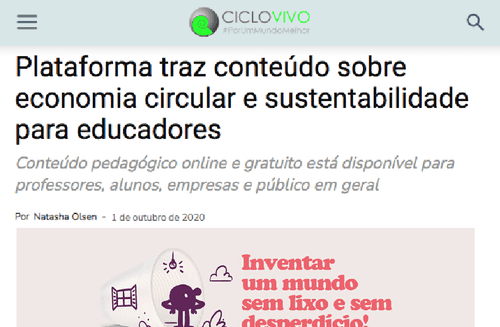
25/05/2021
Circular Movement in Ciclo Vivo
Translated by Google Translate
The Circular Movement wants to involve the whole of society to discuss a more sustainable world, created from a circular economy - a change in the way of consuming and relating to the world. This was the subject of the MC's chat with the people of Ciclo Vivo. Check out and share this idea:
Platform brings content about circular economy and sustainability to educators
By Natasha Olsen
In Brazil, according to data from the World Bank, more than 2.4 million tons of plastic are discarded in an irregular way, without treatment and, in many cases, in open dumps. Approximately 7.7 million tons of waste is sent to landfills.
Papers, metals and glass are other residues that could be recycled, but which are often disposed of incorrectly and are destined for landfills and landfills.
Stimulating the circular economy is an important tool to improve this scenario. Unlike the linear chain of production, use and disposal, the circular economy proposes that the closing cycle: everything is thought from the beginning of the chain and aims to reuse or recycle what is produced.
Do you know the circular economy?
The orientation, within the circular economy, is a change in the whole way of consuming, from the design of the products to our relationship with raw materials and waste, with the objective that what we now call garbage will decrease more and more.
Let's talk about it?
With the purpose of instigating the beginning of a new culture and thinking for a responsibility that belongs to everyone, the Circular Movement is born: www.movimentocircular.io.
The initiative aims to stimulate this conversation and awareness, showing the possibilities of a new reality. The content is available free of charge on an online platform with different approaches to the circular economy, for teachers, students, companies and their collaborators, and whoever else desires.
How are the cities we want for the future?
With access by computer or smartphones, the platform brings topics such as food, industry, opportunities and cities in the future. In addition to the interactive content, several activities are available for teachers and other interested parties, which can be downloaded and edited, which guarantees the autonomy of the educator.
Information available
For Vinicius Saraceni, director of Atina Educação, the objective is precisely to democratize access to quality information. “We want teachers to be inspired, to articulate the use in online classes, for companies to include the themes in their training for employees and so on. The more widespread content on the circular economy, the better - change is urgent. ”
Public and private schools
Teachers of Elementary I, Elementary II and High school can find complete didactic sequences on the platform to apply in the classroom, adjusting and adapting according to their own context. The didactic sequences, which are a practical lesson plan, were developed by a robust teaching staff and produced by teachers Ana Lucia Gomes dos Santos and Marina Rezende Lisboa, with the pedagogical coordination of Prof. Dr. Edson Grandisoli.
All the material is aligned to the National Common Curricular Base (BNCC), and can be used as a complement to the mandatory curriculum of some subjects or as a general and extracurricular activity.
How to Set Up a Lesson Plan and Engage Students in the Circular Economy
"At this moment, when the school dynamics has had a great impact, we are confident that these contents can be of great help, either as an additional stimulus to students, or as a valuable contribution to teachers," says Prof. Dr. Edson Grandisoli.
For Vinicius Sareceni, the subject is fundamental: “a survey carried out with teachers from Atina's training course showed that 66% of technical school teachers had never heard of the term 'circular economy' before. The Circular Movement platform meets the need to fill this gap and offer a ticket to a universe of new possibilities to educate and learn ”.
Map of Initiatives
In addition to the content, teachers and the general public can access the Map of Initiatives, on the “Take Part” page. In this section of the website it is possible to find and register projects that are happening in schools and communities in cities across Brazil.
ETEC educators and students from São Paulo can still participate in the Circular Challenge. It is necessary to participate in the training offered by the platform, with 40h certification, and then enroll an idea to promote a world without garbage.
Atila Iamarino invites: Circular Challenge (Circular Movement)
Companies and public in general
The content can also be expanded to companies, employees and anyone interested in individual learning. Authored by Professor Gina Rizpah Besen, the themes explore the concept of the circular economy and what cities in the circular future will be like, which can be used in corporate training and lectures.

